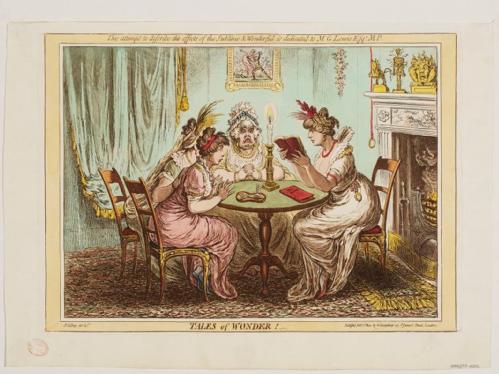2022-23
Please note that in 2022-23 the module was 15 CATS where as it is 30 CATS in 2023-24. The information below will be pertinent to any students resitting aspects of the module from 2022-23.
Module convenor: Dr Jen Baker J.Baker.5@warwick.ac.uk
Value: 15 CATS (1 term, 10 weeks)
Contact Hours: weekly 2 hour seminar, 3 x compulsory lectures
Total contact hours: 21 hours.

Module Description
Engaging with a range of "Tales of Terror" from the Anglophone world/ in English translation c.1770 – 1920, this module will introduce you to the relationship between "the Gothic" (in its various meanings) and "the short form" - from the oral and transcribed folktale; to the narrative poem, through to illustrated sensation tales, and to the high-literary Gothic tale. You will encounter tales of the supernatural, of psychological uncertainty, that are uncanny, and which sometimes include visceral horror. As well as strengthening your close-reading skills, this module will enable you to critically evaluate a developing form in its material, historical, visual, and transnational context; enhancing your understanding of the literary networks in which Gothic tales participated, were transcribed, circulated, appropriated, received, reviewed, and theorised. Thinking also about the aesthetics of these works, you will consider why and how the Gothic (whatever that may mean) was a particularly influential mode in the rise of the Short Story.
Principal module aims and outcomes
This module will introduce students to the early and growing trend of short Gothic literary tales in the Anglophone world and in English translation, c.1770 – 1920. As well as strengthening their close-reading skills, this module will enable students to critically evaluate a developing form in its material, historical, visual, and transnational context; enhancing their understanding of the literary networks in which Gothic tales participated, were transcribed, circulated, appropriated, received, reviewed, and theorised, and why the Gothic was a particularly influential mode in the rise of the Short Story. Finally, through independent research, students will be able to formulate original analyses of Gothic tales within specific contexts that demonstrate a comprehension of the tale beyond the page.
• Demonstrate an understanding of the socio-religious and/or oral/literary traditions from which many tales
derived or were influenced by.
• Describe and explain the formal and stylistic characteristics of selected tales and their adaptations and
appropriations produced in the long nineteenth century.
• Demonstrate knowledge of the publication contexts and material forms in which tales were transcribed,
circulated, and experienced over the course of the long nineteenth century.
• Demonstrate an understanding of the Gothic as a fashionable and controversial mode through which social
anxieties were expressed and through which literary experiments were enacted and theories of literary form
were shaped.
• Analyse the Gothic tale’s relationship to notions of nation, gender, and class in terms of authorship and
readership.
• Formulate original arguments to do with an aspect of the module based on independent research (to be
demonstrated through an essay or creative-critical project).
• Demonstrate the ability to critically reflect on the aims, process, and outcomes of their own research.
Assessment overview
Intermediate Years:
1 x 1000 word critical reflectionLink opens in a new window (30%)
1 x 3000 word research essayLink opens in a new window (70%) which will require students to undertake independent research. You will respond to a set of options based on any aspect of the material you have studied, but must draw on primary texts, archival materials, as well as secondary literature to demonstrate an understanding of the key concepts and contexts covered by the module.
Finalists:
1 x 1000 word critical reflection Link opens in a new window(30%)
1 x 4000 word research essayLink opens in a new window (70%) which will require students to undertake independent research on a topic you devise in consultation with the tutor. You must draw on primary texts, archival materials, as well as secondary literature to demonstrate an understanding of the key concepts and contexts covered by the module.
